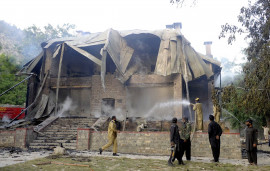
PESHAWAR:
Sheikhan village tells a history of lost glory.
For centuries the village was famous for the production of Bara rice. The rice was so popular that when the Barakzai Sardars of Afghanistan were driven from Peshawar by the Sikh Khalisa Army in 1834, the Afghan government purchased land in the village only to cultivate the rice. The watermills along the banks of River Bara were equally legendary.
Sheikhan is a small village around 10 kilometres from Peshawar Cantonment. The village, which is known as Bara Sheikhan, lies adjacent to Akka Khel with Khyber Agency on one side and Bara tehsil on the other.

The haveli remains in the family and holds on to pieces of the past like suits of armours and rare photographs. However, such a structure is extremely costly to maintain and repair. PHOTOS: RIAZ AHMAD/EXPRESS
The rice disappeared altogether in the 1980s when the river was diverted to supply water for irrigation purposes to Khyber Agency. Moreover, the 400-year-old Baba Jee shrine in Sheikhan, once a place of pilgrimage for the people of Tapa Mohmand, today lies in ruins after Lashkar-e-Islam captured and destroyed the historical site.
Although Sheikhan has lost much of its heritage, what remains standing in its rich cultural tradition is the haveli of Nawab Sheikh Mehboob Ali Khan. Although the estate was reconstructed in 1947, parts of it are at least two centuries old.
Mehboob Ali Khan’s family were considered the elders of the Sheikhan clan, and Mehboob himself served as the deputy commissioner of Malakand and Kohat. His father, Nawab Akbar Ali Khan, was the Hakim of Sheikhan - a title bestowed on him by the British Government in India.
The haveli is spread over at least six acres of land and was originally built on the bank of a nullah outside the main village. However, with the passage of time the entire nullah was encroached upon and now the structure stands in the centre of a modern village.
Mehboob was fond of Persian carpets, pictures of well-known individuals and places, and oil paintings and decorated his haveli with ornaments brought from Russia, Central Asia and India.
Today the haveli is owned by Mehboob’s grandson Sheikh Akbar Ali Khan. The days when his family held great wealth and power are now just a distant memory, but despite his family’s declining influence over the years, Akbar has nevertheless managed to retain and care for the ancestral home.
“Maintaining such a building is extremely costly because of its Victorian style,” he explained while talking to The Express Tribune, adding “It is very difficult to maintain the old furniture, carpets and paintings.”
Every piece of furniture in the building bears a stamp of the family logo- a Quran, a sword and a pen.
Akbar said when his grandfather built the structure he tried to make it suit his taste. A large kitchen with wooden ovens was constructed and villagers were hired to be trained as chefs for English, Pashto and Indian cuisines.

“There used to be a motor room as well as stables for horses and cattle,” said Akbar, adding Mehboob cultivated a large orange garden on the banks of River Bara, which had jogging tracks. Guests would often come there to spend the day.
Although many things are now missing, suits of armour used by warriors, large wall clocks manufactured in Calcutta, rare pictures from British India and a guard still armed with three-naught-three rifles are a witness to the haveli’s place in Sheikhan’s history.
Published in The Express Tribune, July 15th, 2013.
COMMENTS (6)
Comments are moderated and generally will be posted if they are on-topic and not abusive.
For more information, please see our Comments FAQ



































































That'd be Pashtun (not Pashto) cuisine.
Sigh, i wish people live in Peace and Harmony, and think about the future, and think about making friends not enemies, and thinking of peace instead of killing innocents...
It should be marked as an attraction for the foreign tourists in the futures and preserved as part of city heritage. It adds to the beauty of Peshawar.
Sigh to both of the comments above. Move on, and make sure you live peacefully today and tolerate and coexist with those who are different from you.
@Stranger: Sigh I wish I was born 300 years ago before the British came and all of Southern Asia and Western Asia including Persia, Afghanistan, Pakistan and Northern India were all ruled as one. I wish the Kingdom of Mughals or before that Khorasan was never divided!
Sigh wish I were born a century ago or at least 7-8 decades ago. Wish the subcontinent was never divided . sigh ...